Raising Goats for Beginners
This guide on raising goats for beginners will help you get ready both physically and mentally before you bring your first goats to your homestead. If you are a homesteader that is looking to add livestock to your setup, goats are a great place to start out. Whether you raise goats for meat or for dairy the steps to get ready will be the same.
How to Raise Dairy Goats so you feel comfortable and confident from day one.
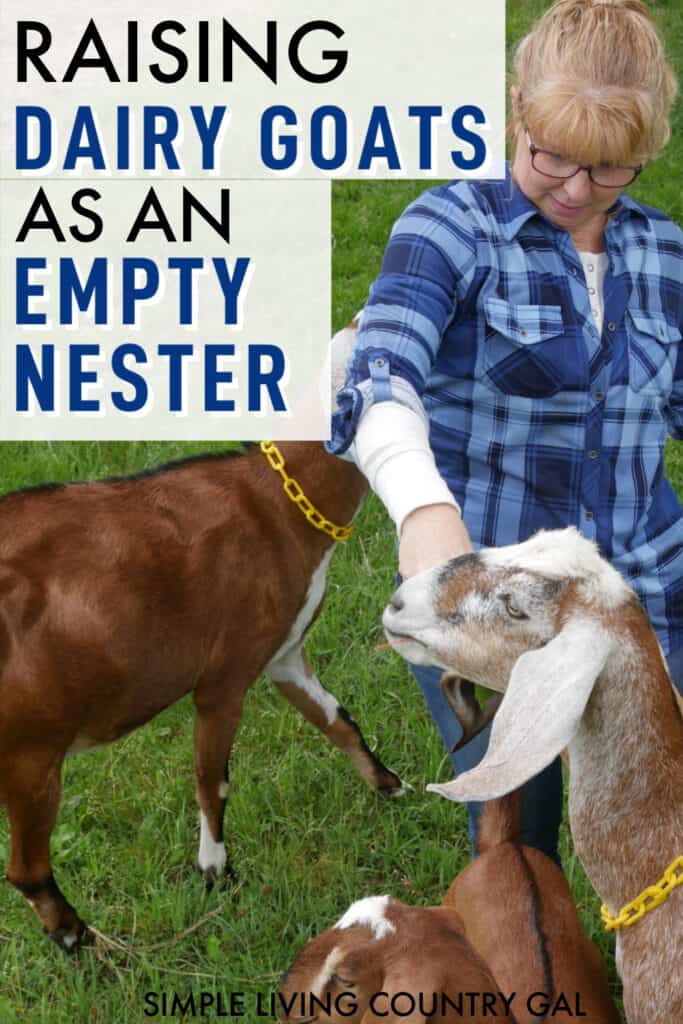
Are you an empty nester or a new homesteader looking to add goats to your setup? If so, get ready for the fun days ahead. Goats, both dairy and meat, are a great addition to have. Not only do they give the best milk, but they are a great working option that will help to keep the weeds and brush under control.
As with any new addition to a homestead, getting things ready so your new additions can adapt in the most positive way can be a bit overwhelming.
In this guide, we will give a good overview of basic goat care, from setting up their home to understanding their nutritional needs. We’ll also talk about setting up a daily routine that will cover all parts of their needed care.
What are the benefits of raising goats?
Of all the animals we have raised on our homestead, goats are by far my favorite. A big part of that reason is because of all the benefits having goats can bring to a running homestead.
- Amazingly Delicious Milk – Not only will you have fresh milk your entire family can enjoy, but that same milk can be used to make cheese, soap, lotions, fudge, and more.
- Brush Control: Goats are great at keeping property cleaner. Not only will they eat grass, but weeds and even poison ivy.
- Companions: Goats make amazing companions not only for people but for other herd animals. You can put a goat with a horse to help them feel as if they are part of a herd.
- Money Makers: You can sell milk, things made with goat’s milk, and goat kids to bring in a nice income to your homestead or hobby farm.
Getting Ready for Your New Goats!
Before you bring your new goats home, there are things you will want to have set up and ready for their arrival. Having as much as you can setup and prepared for their arrival will give a smoother transition to your goats as they get to know their new home.
Shelter
The shelter for your goats should be sturdy and well-ventilated, with enough room for everyone without being or feeling overcrowded. A good rule of thumb is to have about 12-16 square feet of space for each goat.
- Protection from the elements: Goats need to have a space that is out of the rain, snow, and sun. Depending on where you live, you may only need a lean-to shelter, whereas others may need a full barn setup as we do. Having a space that is warm and dry is especially important if you plan to breed your goats in the future.
- Proper ventilation: Good airflow will prevent respiratory issues in your herd. Remember, ventilation is different than drafts, which can cause respiratory issues.
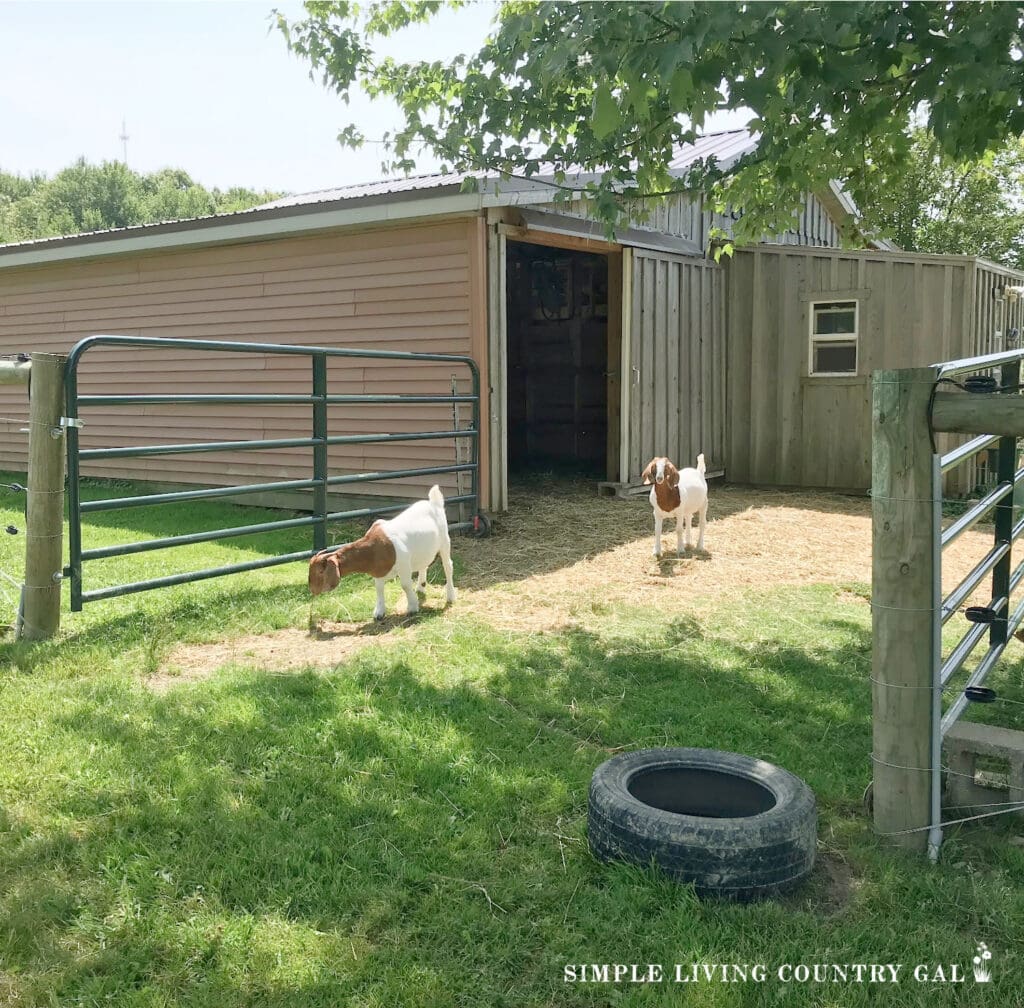
What is the different between ventilation and drafts?
Ventilation refers to the movement of fresh air within a space, while drafts refer to the unwanted flow of outside air that can cause discomfort or health issues for animals. It is important to have proper ventilation in your goat shelter to maintain a healthy and comfortable environment for your goats. This can be done with windows, doors, or vents placed throughout the shelter.
However, drafts should be avoided as they can cause issues such as respiratory infections in goats. This can be prevented by ensuring there are no gaps or openings that allow for excess air flow, especially during cold or windy weather.
Food
Goats love to be out on pasture so they can spend the day eating grasses and weeds. It is important to know that Goats also love to eat leaves, twigs, and bark. This means you will want to protect your trees if they are in your planned grazing area.
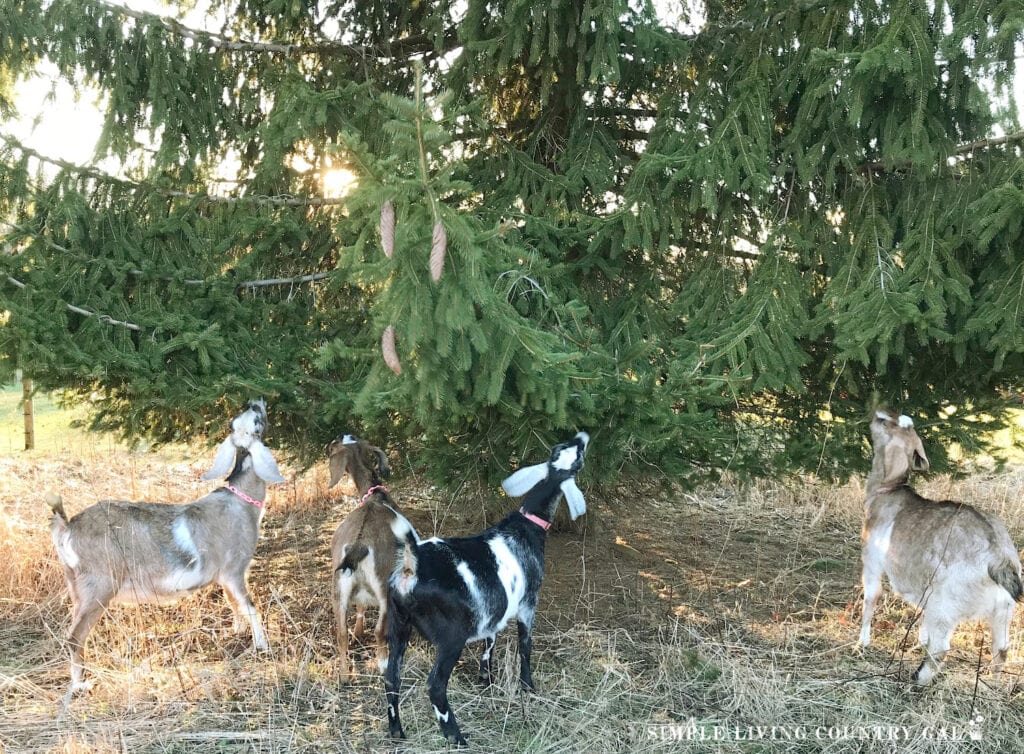
During the off-season, your goat will need a diet of high-quality hay. Read more on hay for goats here. Hay can play an important part in your goat’s nutrition, so you will want to find a source near to you that is affordable and easy to get bales of hay from.
Water
Water is essential for any livestock, especially dairy goats. Be sure your goats have access to fresh water at all times in a few different locations in their shelter and out in the pasture.
MINYULUA Automatic Heated Dog Water Bowl Large Capacity Livestock Waterer Outdoor Pet Thermal-Bowl Drinking Bowl for Dogs Horse Cattle Cow Goat Pig Animal


Minerals
Not all areas and pastures are created equal, and where you live may be deficient in minerals that can affect a goat. To help, you will want to have a mineral block that can provide essential nutrients, especially if your pasture is lacking.
What is the different between ventilation and drafts? Ventilation refers to the movement of fresh air within a space, while drafts refer to the unwanted flow of outside air that can cause discomfort or health issues for animals. It is important to have proper ventilation in your goat shelter to maintain a healthy and comfortable environment for your goats. This can be achieved through windows, doors, or vents strategically placed throughout the shelter. However, drafts should be avoided as they can cause issues such as respiratory infections and hypothermia in goats. This can be prevented by ensuring there are no gaps or openings that allow for excess air flow, especially during cold or windy weather.Pasture size recommendations
For a beginner’s herd of goats, 200 square feet of pasture per goat is a good starting point. Remember, the more space, the better, and rotational grazing can help maintain the quality of the pasture.
What is rotational grazing?
Rotational grazing goats is a technique where goats are moved to different sections of pasture, allowing each section to rest and regenerate before being grazed again. This not only improves the health of the pasture but also prevents overgrazing and reduces the risk of parasites in a goat herd.
Understanding Goat Basics
To raise goats successfully, you should familiarize yourself with some common goat terms and their meanings. Here is a very short list to get you started.
- Does – Female goats who have given birth or are capable of giving birth.
- Doeling – A female goat under one year of age.
- Wethers – Castrated male goats.
- Bucks – Intact (not castrated) male goats.
- Buckling – A male goat under one year of age.
Healthcare tips for a healthy herd
Keeping your goats healthy is an important part of raising a thriving herd. Here are some essentials:
- Vaccinations: Work with a local veterinarian to determine the necessary vaccinations for your area.
- Quarantine: Introduce new goats to your herd with caution, placing them in quarantine for at least 3 weeks to monitor for illnesses before adding them to the main herd.
- Parasite control: Regular deworming is crucial, and you should also practice pasture management to prevent overexposure to parasites.
Read more on setting up a Goat Worming Schedule here.
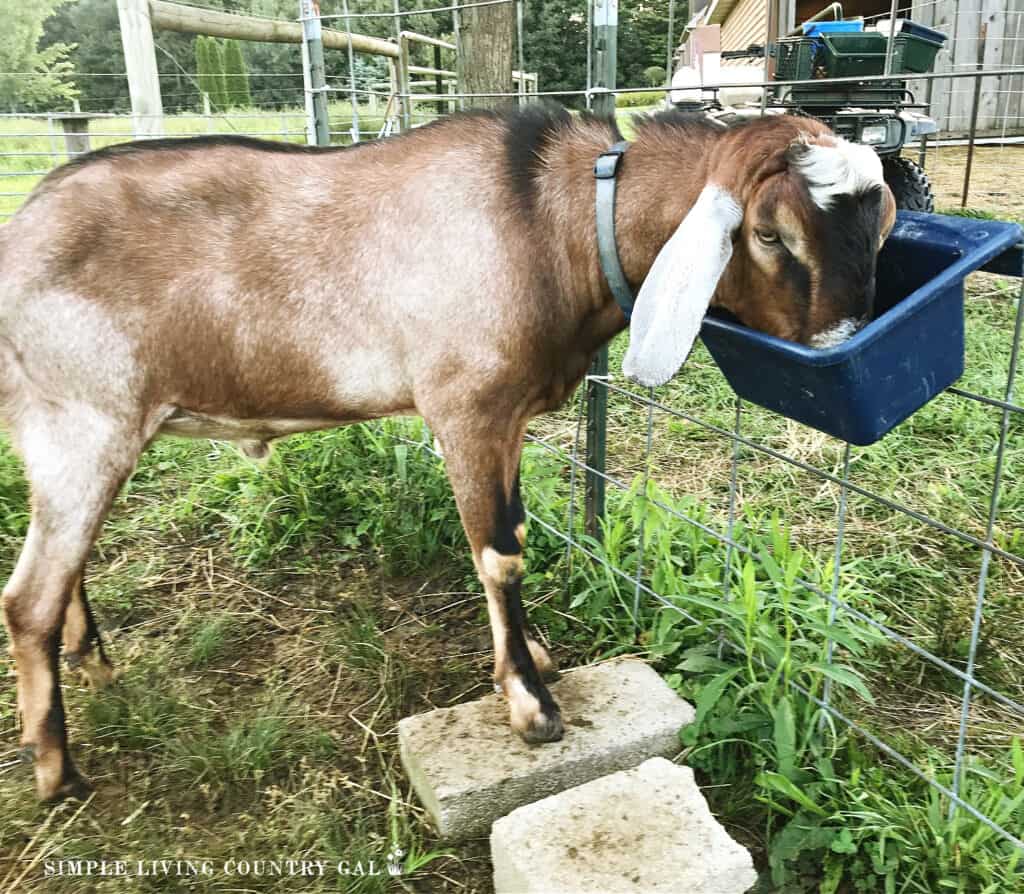
Tips to raise healthy goats
- Regular checkups: Inspect your goats daily for signs of illness or injury. You can do this when you are out feeding your herd. Touch your goats so you can feel for changes in their body condition. A goat’s fur can mask weight loss better than you may realize.
- Records: Keep detailed health and production records for each goat. This is especially important for breeders and dairy goats.
- Clean consistently: There are a few areas you will want to keep clean with your goats. First is their living areas – Clean their living areas regularly and manage their waste to prevent the buildup of harmful bacteria. Next is their water bowls – Each week, wash all water bowls to ensure they get the freshest water.
Establishing a Daily Care Routine
Caring for goats is a hands-on commitment. Knowing what is expected before you invest in your first goats will help you to be better prepared. Here’s what a typical day of caring for a dairy goat:
Morning:
- Give fresh water and hay to any goats that are not in milk.
- Replenish any mineral containers.
- For goats in milk, start your milk morning routine. Feed and milk each milker until you have done them all.
- Once done, if weather permits, release your herd out to pasture.
- Spot clean any areas and replace bedding if needed.
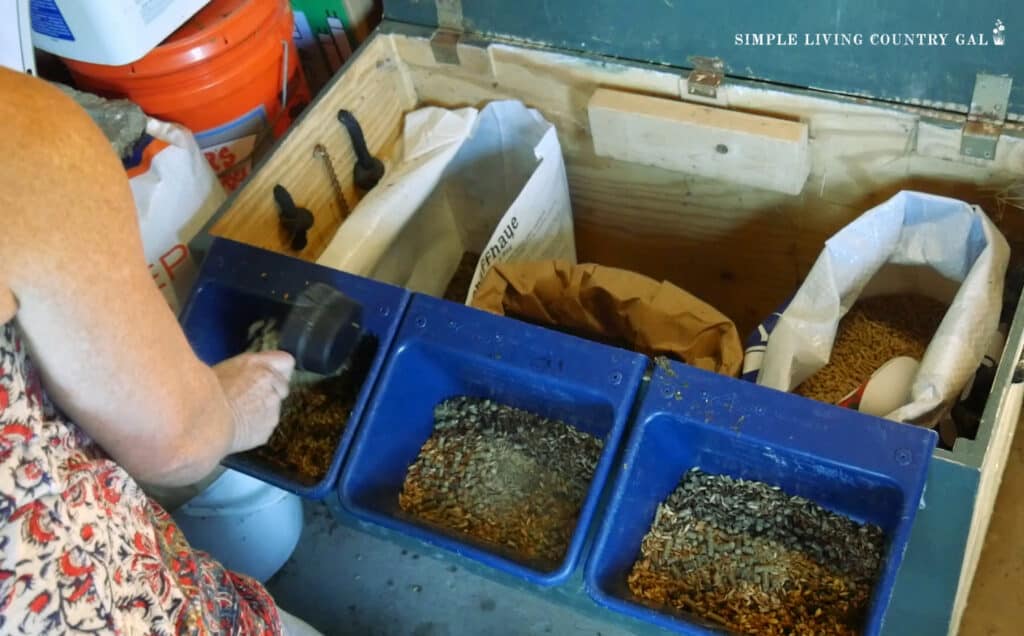
Afternoon:
- If it’s a hot day, replenish waterers.
- If it’s a cold day, check and replace any water that may be frozen.
- Look over your goats to ensure everyone is there and being an active member of the herd. Remember, a quiet goat that is standing off on their own is a sick goat, and investigation may be needed.
Evening:
- Spot clean any areas and replace bedding if needed.
- Call the herd back to their shelter.
- For goats in milk, start your milk evening routine. Feed and milk each milker until you have done them all.
- Replenish hay if needed.
- Replenish water if needed.
- Lock the herd down for the night.
It’s true that goats require daily chores by having a routine you will be able to get things done in a short amount of time.
Raising goats can be fulfilling and fun. Whether you’re looking to fill the quiet of an empty nest with a few dairy goats or you want to grow your homestead, goats can be a wonderful addition. Even though goats have a chore list you will need to do each day, the rewards they give, make all the work worth it. Keep this Raising Goats for Beginners guide close by so you can get your homestead and your schedule ready for your new additions.




